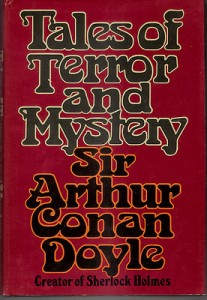 Title: Tales of Terror and Mystery (Goodreads)
Title: Tales of Terror and Mystery (Goodreads)
Author: Arthur Conan Doyle
Published: Knopf Doubleday, 1913
Pages: 224
Genres: Crime, Short Stories
My Copy: Library Book
Buy: Amazon, Book Depository, Kindle (or visit your local Indie bookstore)
When we talk about Sir Arthur Conan Doyle, Sherlock Holmes always seems to be one of the first things that spring to mind. Sadly for this Scottish writer, this turned into both a blessing and a curse. Firstly, Sherlock Holmes remains a seminal part of crime writing and English literature, but limited the writer’s chances in exploring something different. In 1893 Doyle famously tried to kill off Sherlock Holmes in the story “The Final Problem” but due to public outcry and high demands the eccentric detective returned in the 1901 novel The Hound of the Baskervilles.
While Arthur Conan Doyle is known for his prolific writing, he didn’t gain much recognition for his works outside of Sherlock Holmes. Even though some critics believe his historical novels are some of his best works and The Lost World being the inspiration behind Michael Crichton’s Jurassic Park. I picked up Doyle’s 1923 short story collection Tales of Terror and Mystery as part of our book club, but this afforded me the opportunity to explore his writing outside of Sherlock.
Tales of Terror and Mystery is a collection of thirteen short stories broken up into two topics; six stories on terror and seven on mystery. The book kicked off on a positive gear, the tales of terror are almost like a homage to Edgar Allen Poe. Even the short story “The New Catacomb” has a remarkable similarity to Poe’s “The Cask of Amontillado”. What I enjoyed about these tales of terror was the way Doyle went a little darker and macabre to what I expected from this author.
Having such a great experience with the tales of terror it was a shame to move onto the tales of mystery. Here is a fun experiment; replace the protagonist name with Sherlock Holmes in these stories and see if they feel any different. It doesn’t work in all the stories; I wanted Conan Doyle to explore different styles of writing but I felt like the tales of mystery was almost like Holmes stories at times and the rest just didn’t work too well at all.
Some of the stories with Tales of Terror and Mystery worked really well but then the rest just feel short. I loved that Arthur Conan Doyle seemed to be influenced by great short story writers like Edgar Allen Poe or H.P. Lovecraft in some of the stories. However for the most part I was left wanting something a little more. Also, like what I have found with Doyle’s writing, there are some incredibly racist moments within this collection, with stories like “The Japanned Box” and “The Jews Breastplate”. After reading The Sign of Four earlier this year I have come to expect this colonialism nature from his writing. I like that some of these stories were macabre but overall I think this lacked the stylistic approach I am used to from this author.

 Title: The Canterbury Tales (
Title: The Canterbury Tales ( Title: Levels of Life (
Title: Levels of Life ( Title: Foreign Soil (
Title: Foreign Soil (
 Title: The Last Girlfriend on Earth and Other Love Stories (
Title: The Last Girlfriend on Earth and Other Love Stories ( Title: Books (
Title: Books ( I’m currently in a reading slump and about to start another semester of university. This is not a good combination; I don’t want to struggle through my reading while trying to get good grades. This is not the first time I’ve fallen into a slump and I find it so frustrating and stressful. When I finally do break out of a slump, it is so refreshing and I feel so relieved.
I’m currently in a reading slump and about to start another semester of university. This is not a good combination; I don’t want to struggle through my reading while trying to get good grades. This is not the first time I’ve fallen into a slump and I find it so frustrating and stressful. When I finally do break out of a slump, it is so refreshing and I feel so relieved. Title: Snapper (
Title: Snapper (